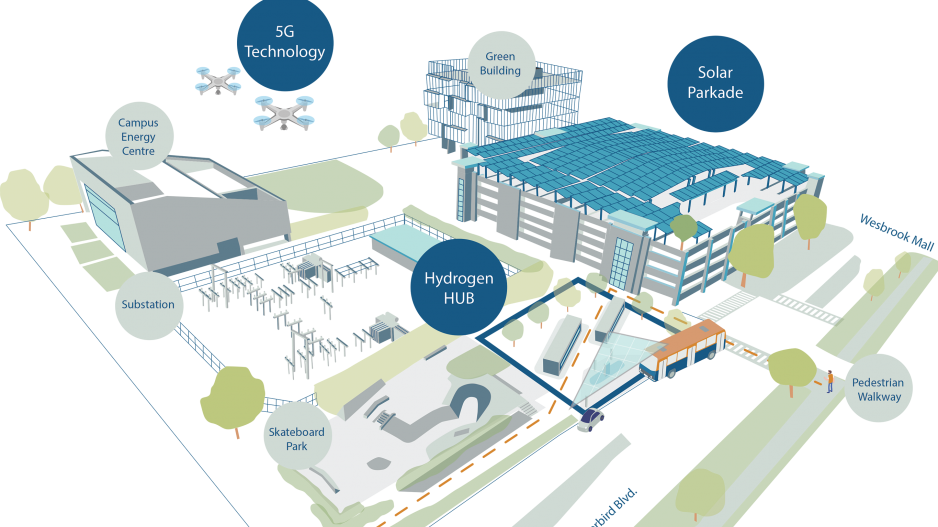There aren’t a whole lot of hydrogen fuel cell vehicles on the road in Vancouver yet, but for those who do have them, or plan to buy one, they will have a new fueling option at the University of BC.
UBC announced plans Wednesday to install a new hydrogen fueling station at its campus.
It will be no ordinary hydrogen fuelling station, however. It won’t be importing hydrogen from places like Quebec or Alberta – it will be made on site, from solar power and water. And electric vehicle owners at UBC will be assisting by essentially making their car batteries available for electricity storage.
The new fueling station will be part of a $23 million clean energy hub that will produce its own green hydrogen, using solar energy and an electrolyser.
The project includes installing solar panels on the Thunderbird parkade at the UBC campus – with a maximum generating capacity of 1 megawatt.
The system will be connected to a smart power system than will allow any electric vehicle plugged into the system to both charge, using solar power generated on site, and be used to store some of that power.
Some of the power produced will be used to produce hydrogen from water using an electrolyser, which separates hydrogen from water.
Initially the plan is to produce 100 kilograms of hydrogen per day, though that production can be scaled up, if demand increases.
“We are aggregating as many electric vehicles as we can into this parking garage,” said Walter Merida, associate dean of research and industrial partnerships at UBC’s faculty of engineering.
EVs in the parkade will essentially be used to store power from the solar panels.
“We are then delivering that renewable electricity to a smart and reversible energy management system," Merida said. "By aggregating the capacity of many electric vehicles, we can perform city scale energy storage and vehicle to grid transactions.”
The total cost of the project is $23 million, most of which will come from various government agencies, like the Canada Foundation for Innovation, Natural Resource Canada and the Western Diversification Fund.
The B.C. government is contributing $5.6 million in carbon credits under B.C.’s low carbon fuel standard program. UBC can sell the credits on the carbon market to generate revenue.
“This is just one of the 22 projects receiving credits as part of our 2020 program,” said Bruce Ralston, B.C. minister of Energy, Mines and Low Carbon Innovation. “If successful, these projects will lead to total fuel supplier investments of over $2.1 billion over the next five years.”
“This project demonstrates the viability of hydrogen production, distribution and use right here in British Columbia.”
UBCplans to see the hydrogen fuelling station and the solar panels installed in 2022.




